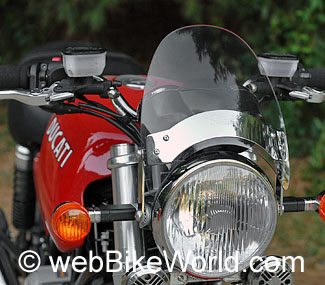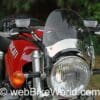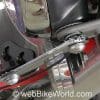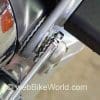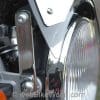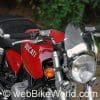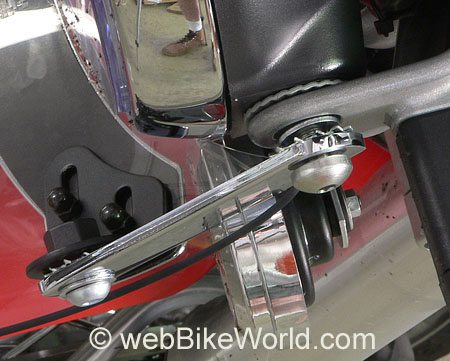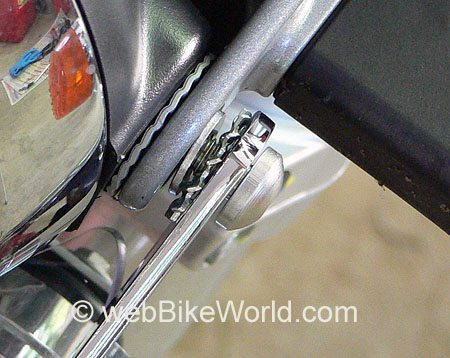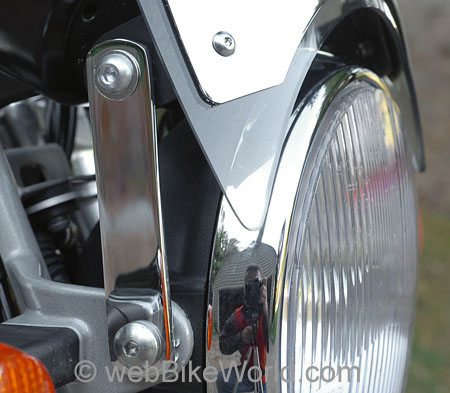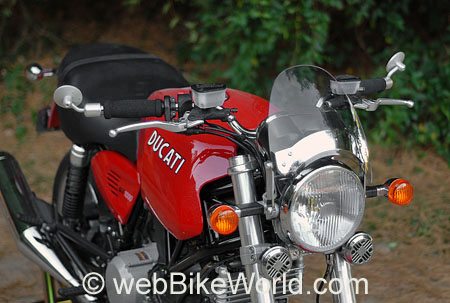Back in the old days (uh-oh, here he goes again!), accessory windscreens for motorcycles were offered by a handful of companies who had never put the words “customer” and “service” in the same sentence.
Anyone under the age of 40 or so probably doesn’t realize that prior to 1976 there was basically no such thing as a factory fairing on a motorcycle.
Sure, that may be a bit of an overstatement, because I guess Harley probably offered a windscreen on one of their touring models. But as far as I’m concerned, BMW started the revolution when they released the incredibly radical (for the time) R100RS in that year, which set the stage for the manufacturers to finally consider offering factory-installed wind protection…and style.
There were no other fully-faired motorcycles; no sportbikes, sport-tourers or anything else that looked good and racy and also protected the rider.
I was desperate for the café racer look back then and I customized my RD400 accordingly. I bought a cheap fiberglass “bikini” fairing but the thing was such a piece of … junk that I never could figure out how to get it installed without falling apart.
What else could I do? The clear windscreens that were available looked about as dorky as a mustache on a pineapple, so that wasn’t an option.
Every once and a while, some company would come out with a new type of windscreen system but of course they’d have mounting hardware for every bike made except yours. Anyone remember the name of the company that made the “egg” shaped clear windscreen that completely covered the front of the bike, including the headlight? They’re long gone, I assume.
Anyway, the problems and lack of quality led me to give up on the entire notion of an aftermarket windscreen for any of my bikes. It just wasn’t worth the frustration of going through the trouble of ordering one, paying for it, futzing for hours trying to get it installed and then having it look like junk.
So I was naturally skeptical when I found this fly screen for the Ducati GT1000. It’s from Custom Sport Classics (see below) and it carries their part number DCC-079, the “National Cycle Fly Screen”. It’s available in two versions, the clear shown here or in a mildly dark tint and it fits the Ducati Sport 1000 and GT1000 models.
The product is actually the National Cycle model number N2532 “Fly Screen LS”, although the photos on the National Cycle website show it mounted on various cruisers. As of this writing, they don’t list the GT1000 as a bike that will fit this fly screen (or vice versa), so I guess the Custom Sport Classic folks did some experimenting and discovered that it will fit.Apparently things must have changed quite a bit since the last time I tried to mount an aftermarket windscreen, because this one fits like a gem. The hardware is a perfect match for the GT1000, the instructions are simple and straightforward and the chrome plating on the brackets is thick, shiny and flawless.
The fly screen comes with all the mounting hardware necessary to fit the GT1000. It only took me about 20 minutes to install it. I loosely connected everything together and then unscrewed the bolts on the sides of the GT1000’s headlight, fit the screen in place, lined it up and tightened everything down. It took me much longer to take the photos then to install the screen.
A pair of longer replacement bolts are provided for the Ducati’s headlight shell, but I found that the original parts worked fine so I used them instead. The fly screen can be adjusted back and forth and side to side if necessary, but everything seemed to be lined up perfectly as soon as I assembled it.
The mounting kit includes some “star” lock washers to prevent the fasteners from becoming loose. The photo above shows a close-up of the mounting assembly. It’s a bit difficult to tell because of the close-up, but in this photo the fly screen is folded down over the front of the headlight, laying horizontally above the front fender.
Also shown are the chrome-plated mounting bracket, the original Ducati headlight shell bolt on the right and the star washers and flat washers from the mounting kit.
The black dome nuts on the back of the fly screen and their horizontal adjustment slots are also visible in the photo above. I didn’t have to adjust anything there and simply tightened the nuts in place, making sure I was careful not to apply too much torque.
The photos below show another close-up of the side mount. Note that the bigger wavy washer on the left is the Ducati original part; it is not replaced and doesn’t have to be moved.
There’s also a view of the side of the headlight with a close-up the chrome-plated vertical mounting bracket.
And the photo above shows the finished product. I think it looks great, especially with the Oberon Bar End Mirrors! I purchased the original Ducati accessory windscreen for the GT1000 but it’s sitting in the garage in its original box; I like the fly screen much better.
UPDATE: wBW visitor “R.B.” reminded me that I forgot to comment on the performance of the fly screen! Sorry about that… The answer is that it does block some of the air that would normally hit my chest, but not really enough to notice.
I can put my hand in back of the screen at chest height and feel the dead air, but the “bubble” of air only extends back about 3/4 of the length of the fuel tank. The good news is that it doesn’t seem to cause any undue turbulence that I can notice through the handlebars and it doesn’t affect helmet noise levels.
So I wouldn’t say that this particular fly screen is a replacement for a full windscreen, but hey — it sure looks cool!
| Product Review: Motorcycle Fly Screen | |
| Available From: Custom Sport Classics | Suggested Retail Price: $89.99 |
| Colors: Silver or Black. | Made in: England |
Note: For informational use only. All material and photographs are Copyright © webWorld International, LLC – 2000-2011. All rights reserved. See the webBikeWorld® Site Info page. NOTE: Product specifications, features and details may change or differ from our descriptions. Always check before purchasing. Read the Terms and Conditions!


